Ranking all 36 Champions League teams: Can anyone stop Real Madrid or Man City?
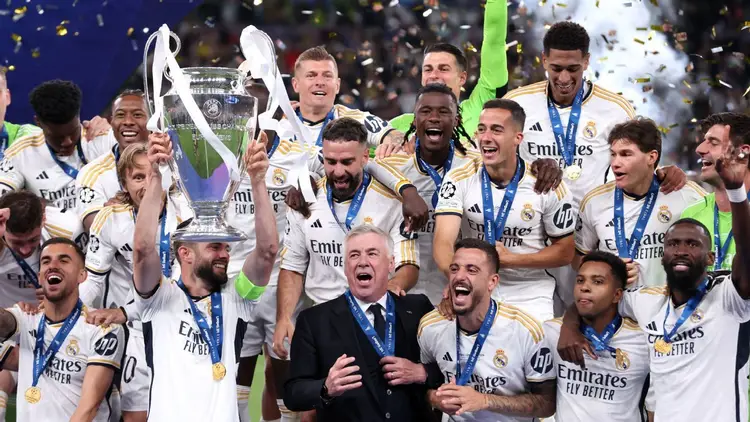
Ryan O'Hanlon, a writer for ESPN.com, published an article on September 17, 2024, at 1:00 PM.
This year, the UEFA Champions League features a record number of teams and matches. The group stage, which consists of six matches and a single league table, kicks off on Tuesday and will run until January 29.
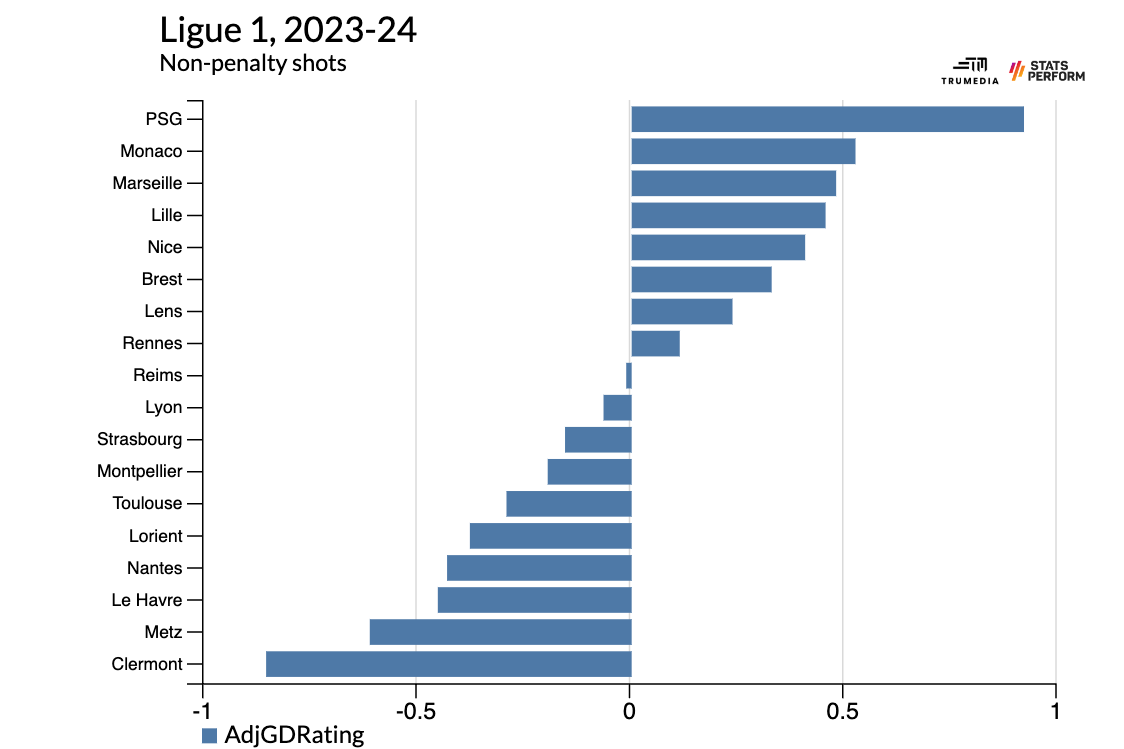
There's a lot to discuss and a ton of soccer to enjoy, so instead of dragging this out with a lengthy introduction, let’s jump right in.
The new format of the Champions League features 36 teams in the group stage. I've organized these teams from 36 to 1 according to my assessment of their chances of clinching the Champions League title. So, where do Aston Villa stand in comparison to Juventus? What about Brest versus Girona, or Barcelona against Liverpool?
Here’s how the teams are assessed before the matches kick off.
According to Transfermarkt, the total market worth of the Bratislava team is estimated at €24.2 million. This amount is less than half of what any other team in the tournament is valued at and even falls short of the sum Chelsea spent on a backup goalkeeper earlier this summer.
Even though Dinamo Zagreb ranks just below Slovan, they are much nearer to 29th place than to 36th. Zagreb, along with the next six teams on our list, shares similar odds for winning the title, which translates to an implied probability of roughly 0.16% for each team.
In previous years, the highest achievement for a team like this would typically be securing a place in the Europa League. However, with the new format, all that's needed is to finish among the top 24 to advance to the initial knockout stage.
So, how old are the players on the team? The average age of the Swiss squad is 24.2 years, which ranks as the 12th youngest in the tournament. In contrast, the team with the youngest players is Red Bull Salzburg, with an average age of just 21.13 years.
"Red Star Belgrade: A Serbian Football Icon"
No other club illustrates the impact of Champions League money on Europe’s smaller leagues quite like Red Star does. In the most recent Champions League, Red Star managed to secure just one draw and suffered five losses. Meanwhile, in their domestic league, they have only lost four matches in total over the last five seasons.
Watch for 18-year-old central midfielder Malick Yalcouyé, currently on loan from Brighton, which is arguably one of the most intelligent clubs in soccer. Brighton invested €7 million to sign him from the Swedish team IFK Göteborg after he had only played 956 minutes at the professional level. According to FBref, he stands at 5 feet 5½ inches tall and weighs 128 pounds.
Sparta Prague has quietly established itself as one of the more forward-thinking teams in Europe. Their former manager, Brian Priske, had a background in the data-focused environment of Denmark's FC Midtjylland before recently moving on to Feyenoord to take over from Arne Slot, who became the new Liverpool manager. Under Priske, Sparta Prague excelled at set pieces—one of the best teams in Europe in that regard. The question now is whether they will maintain that level of performance with their new coach.
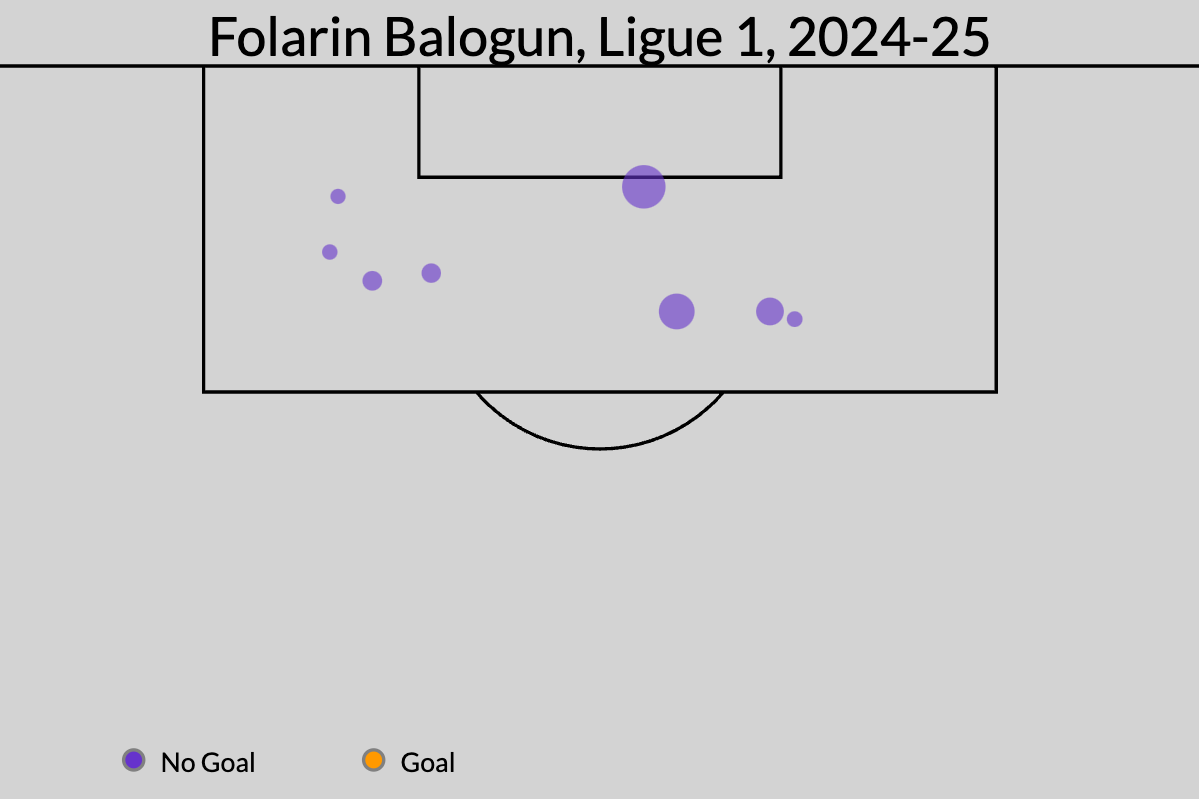
Although Celtic may not pose the same threat as they once did, as evidenced by their combined goal differential of minus-21 in the last two Champions League group stages, they should be commended for their extensive scouting efforts. Out of their 11 most valuable players listed on Transfermarkt, only two hail from Scotland. The rest of the lineup features three players from Japan, two from the United States, and one each from Belgium, Canada, Honduras, and Poland.
In contrast to Celtic, Brugge has shown a bit more vitality in the Champions League in recent years, making it to the round of 16 two seasons ago and delivering a solid performance in the group stage the season prior. However, this summer, they lost their top scorer Igor Thiago to Brentford and promising talent Antonio Nusa to RB Leipzig. Additionally, in previous seasons, several key players have departed for clubs like AC Milan, Lens, PSV Eindhoven, and Bayer Leverkusen.
Do they still possess the elite talent to pose a threat to anyone this time around?
Considering the financial edge they possess compared to other European teams, how is it possible for a club from one of the Big Five leagues to rank this low? Take a look:
Using the metric of 70% expected goals and 30% actual goals, it's clear that Brest resembled a Conference League team more than a Champions League contender.
Considering that their nation is currently engaged in conflict, Shakhtar's achievements in the Champions League over the last two seasons are remarkable: they have secured four victories, three draws, and faced five defeats, with a total of 18 goals scored and 22 goals conceded. Because of the ongoing war, Shakhtar is unable to play at their home ground. Additionally, the team has experienced a decline in talent compared to previous years, as their roster now includes fewer players from abroad.
The energy drink company’s Salzburg branch missed out on the Austrian league championship last season, ceding it to Sturm Graz for the first time in over a decade. In reaction to this setback, they appointed Pep Lijnders, who served as Jurgen Klopp's assistant at Liverpool, to take on his first permanent managerial role. Additionally, they signed Bobby Clark, who played in five Premier League matches last season, and secured Stefan Bajcetic on loan from Anfield.
This situation is akin to what happened with Brest. Last season, Bologna ranked among the stronger teams in Serie A, rather than being a definitive top-four contender. They actually secured a fifth-place finish and took advantage of the tournament's expansion to 36 teams. Additionally, they parted ways with their coach, Thiago Motta, who moved to Juventus, and also saw their two standout players, Riccardo Calafiori and Joshua Zirkzee, leave for Arsenal and Manchester United, respectively.
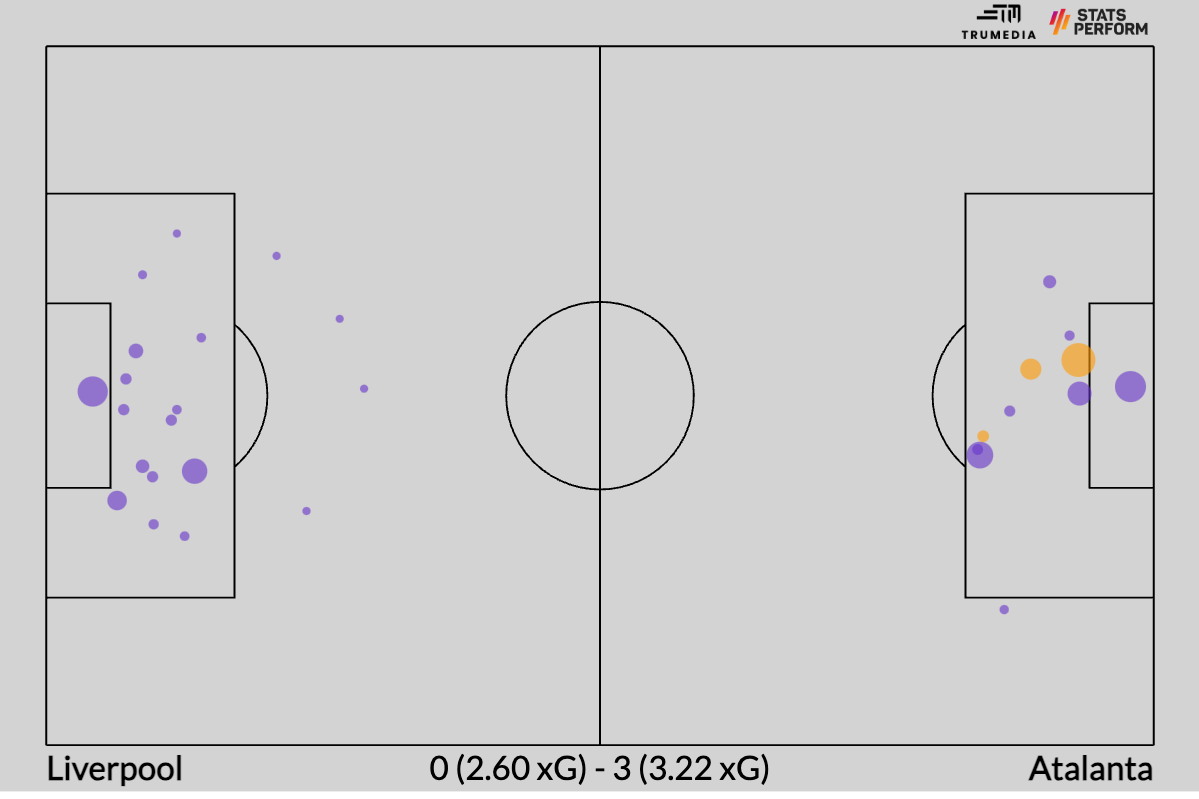
After four matches in the Serie A season, they find themselves only one point away from... the relegation zone.
The winners of the Eredivisie in 2022-23 actually earned more points last season compared to the previous year, yet they ended up in second place because PSV had an extraordinary season, one of the best ever seen in the Dutch league. While I have great respect for Priske, it was Slot who truly changed the course of the club. Additionally, they lost key players such as Mats Wieffer and Yankuba Minteh to Brighton, and Lutsharel Geertruida transferred to RB Leipzig over the summer. It's tough to imagine them not experiencing a decline this year.
In contrast to Brest and Bologna, I believe Girona was truly a team worthy of the Champions League last season. They managed to retain their coach, Michel, but unfortunately, they lost their top four players during the summer: fullback Yan Couto, midfielder Aleix García, winger Savio, and striker Artem Dovbyk. If they can bounce back from these departures and remain competitive in LaLiga and the Champions League, Michel will be in a great position to choose any job he wants next summer.
In contrast to Brest, Bologna, and Girona, Stuttgart performed at a high level last season, even finishing above Bayern Munich in the standings! They managed to retain their sought-after coach, Sebastian Hoeness, but like others, they also had to part ways with some key players. Center-back Hiroki Ito moved to Bayern Munich, while center-back Waldemar Anton and forward Serhou Guirassy transferred to Borussia Dortmund.
To fill the gaps left by departing players, Stuttgart used the summer to bring in a large number of new signings, enough to create several competitive NBA rosters. While taking this approach of diversifying their investments—rather than just aiming for a few high-profile acquisitions—could be beneficial for the club's stability in the long run, it may not be the most effective strategy for improving their performance in the Champions League.
This group is quite unique.
Angel Gomes and Jonathan David are two promising players who are now entering their prime years. Additionally, Edon Zhegrova has emerged as an interesting winger, having completed his first nearly full season as a professional. Apart from these three, the team has several other players who previously played for notable clubs, including André Gomes, Nabil Bentaleb, Rémy Cabella, Samuel Umtiti, Mitchell Bakker, Thomas Meunier, and Ethan Mbappé, Kylian's younger brother.
Following several consecutive seasons of parting ways with some of the priciest strikers and central midfielders in football history, Benfica has set its sights on a promising talent: 20-year-old center back Antonio Silva. While the midfield boasts a wealth of skill, the forward position currently relies on 25-year-old Vangelis Pavlidis, whom they purchased for €18 million from AZ Alkmaar. Pavlidis had an impressive season in the Eredivisie, but many strikers have shone in that league before struggling to perform at other clubs.
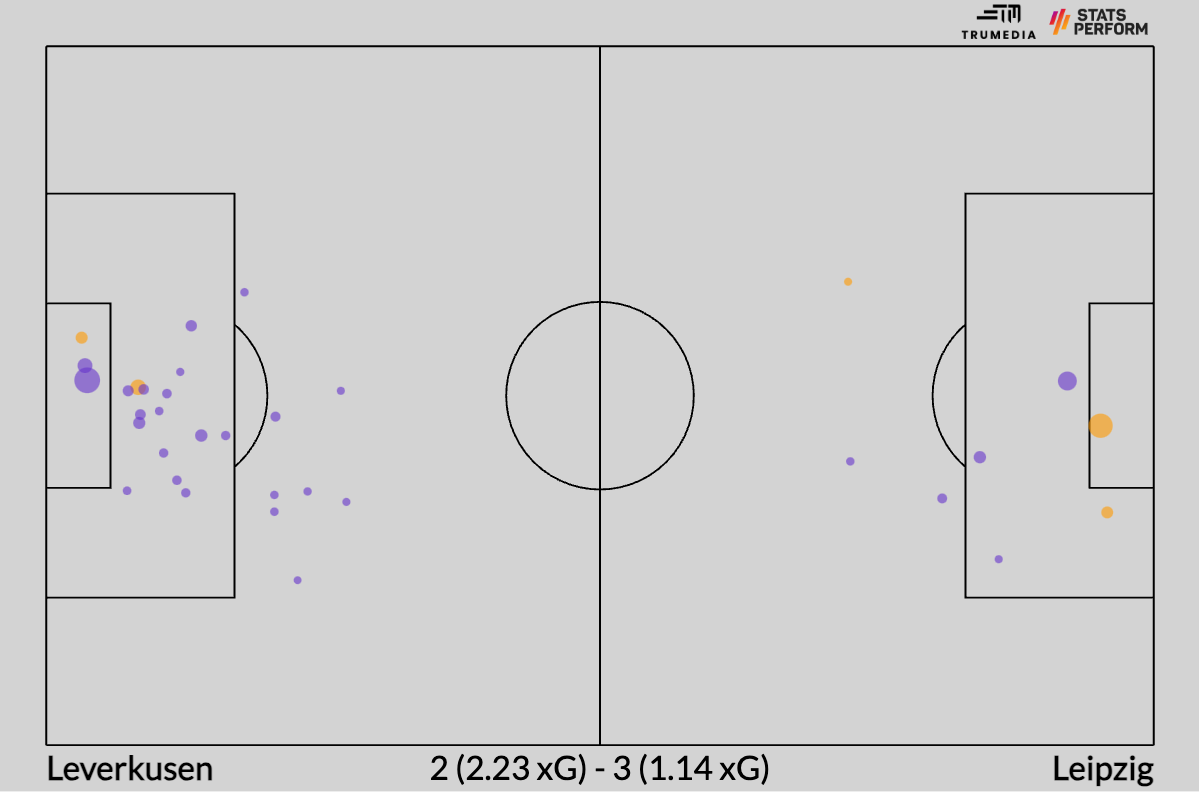
Can they repeat their success, and will it lead to achievements in Europe? Unlike the other clubs mentioned that had exceptional seasons, PSV has kept their coach and all their important players. After five games in the Eredivisie this season, they have scored 20 goals while allowing only three. American players Malik Tillman and Richy Ledeza have both been in the starting lineup for all five matches.
In a spirited chant reminiscent of sports events, you might hear fans enthusiastically shout, "P-S-V! P-S-V!"
Talking about American players, Folarin Balogun has continued his strong performance from last season. He's been a starter in about half of the Ligue 1 games and has impressive statistics, although they haven't translated into a lot of goals so far. Last season, he had an expected goals figure of 8.5 (not counting penalties) but only scored 7 times. This year:
He has participated in three matches, attempted eight shots with a total expected goals (xG) of 1.3, but hasn't managed to score any goals.
Here’s another team that isn’t exactly at the top tier, but had an impressive season last year. They managed to keep their coach and all their important players. Sporting clinched their second Portuguese league title in four years under Ruben Amorim, marking their first league win in 19 years before Amorim and his team took over. Striker Viktor Gyokere, along with center backs Gonçalo Inacio and Ousmane Diomande, might be looking to leave for big transfers in the next year, and there’s also a chance that Amorim could depart as well.
Among the clubs not in the Big Five leagues, Sporting is in the strongest position to pull off an unexpected breakthrough.
This was certainly one of the most remarkable displays by a visiting team at Anfield that you'll ever witness:
I’ve included them here to honor Gianpiero Gasperini and to acknowledge their impressive journey to winning the Europa League last year, where they triumphed over teams like Liverpool and Leverkusen. However, Atalanta hasn’t had a great start to the Serie A season. In three out of their four matches, they’ve allowed more expected goals than they’ve generated, and in the one match where they didn't, they found themselves trailing 4-0 against Inter Milan within the first hour.
Even though they were classified as a Pot 1 team for the draw, I view them as just slightly above a Pot 2 team. They did break Bayer Leverkusen's long unbeaten streak in the Bundesliga, and they managed to achieve this away from home. However, let's be real:
Loïs Openda could be considered one of the most overlooked forward players in this tournament. He has netted 42 goals (not counting penalties) and provided 11 assists over the last two seasons in Ligue 1 and the Bundesliga. Meanwhile, Xavi Simons and Benjamin Sesko are seen as promising talents, with opinions varying on just how good they might become. However, the level of skill and depth in the player pool behind these three isn't what it used to be.
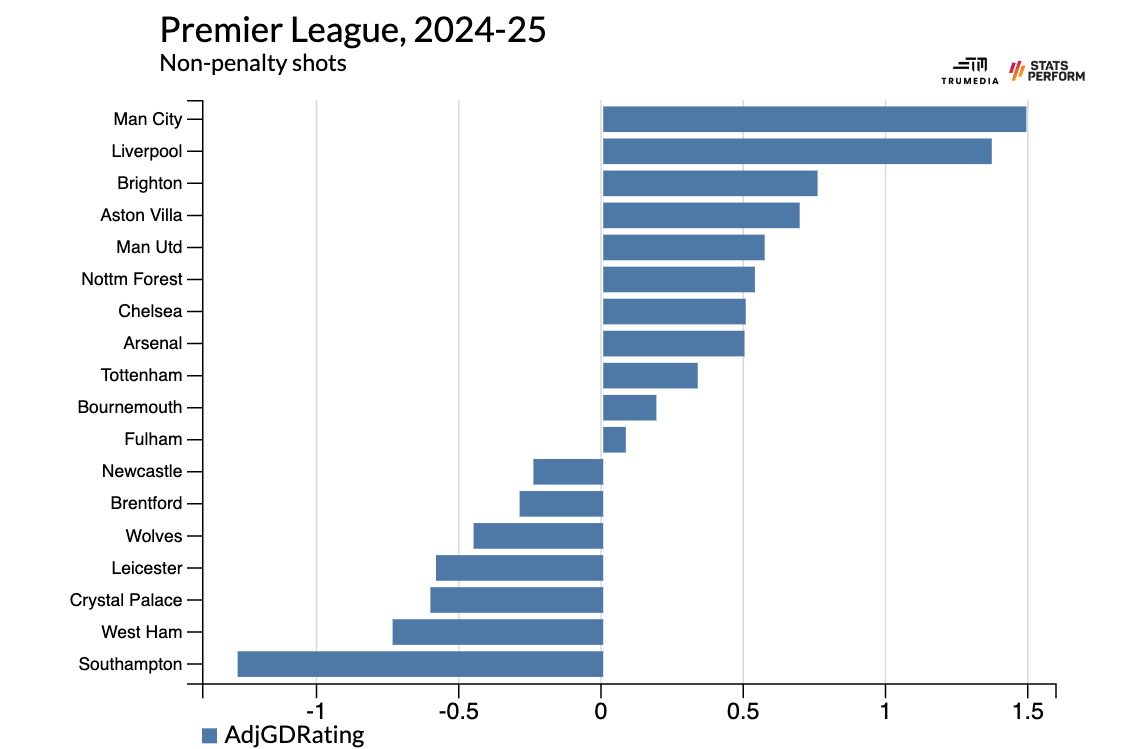
After four matches, it's clear this team relies heavily on two players. Christian Pulisic and Rafael Leão have been exceptional, with Pulisic contributing an average of 0.82 expected goals plus assists (excluding penalties) per 90 minutes, and Leão outperforming him at 0.93. Given their impressive performances, why are they not ranked higher and why is their team sitting in ninth place in the Serie A standings?
The issue at hand is that there hasn't been much contribution from other players in the attacking zone. Apart from Pulisic and Leao, no other Milan player even comes close to averaging 0.4 non-penalty expected goals and assists per 90 minutes.
After playing four matches in the Premier League, Villa has shown impressive form. They surprised everyone by securing a fourth-place finish last season, and now they're level on points with third-place Liverpool. Their performances have consistently reflected that of a top-four team:
Will they manage to escape the fate Newcastle faced last season? Eddie Howe's team started strong but eventually faltered as the demands of the Champions League weighed them down. One key distinction—aside from not having a sovereign wealth fund behind them—is that Unai Emery is well-versed in handling both European and domestic competitions at once. Additionally, even though Aston Villa ended up in Pot 4, they have a favorable draw. They’ll be up against only two teams ranked higher, and both of those games will take place at Villa Park.
Thiago Motta was expected to bring in a new style of football focused on intricate, advanced ball control. However, the current outcome has aligned more with the typical Juventus approach: a squad that finds it tough to score but poses a great challenge for opponents trying to find the net. They've managed to boost their ball possession percentage by 10% this season, reaching 58%, yet their attempts on goal have dropped significantly, falling from 14.0 to 10.8 per 90 minutes. Although they are struggling to generate scoring chances, they are leading the way defensively, being the toughest team to break down not just in Serie A, but across all of Europe this season.
If you don't have a favorite team in these games and you prioritize taking care of yourself, it's best to steer clear of Juventus matches altogether.
Is this team any more improved compared to last year? Four players who kicked off the Champions League final against Real Madrid are no longer with the team. They had a strong chance of winning that game—and arguably deserved to win—but their path to the final was facilitated by a favorable draw that placed all four top contenders in the same half of the bracket.
Visiting the Westfalenstadion remains a significant challenge, but being eliminated before the quarterfinals seems more probable this time than experiencing a repeat of last year's events.
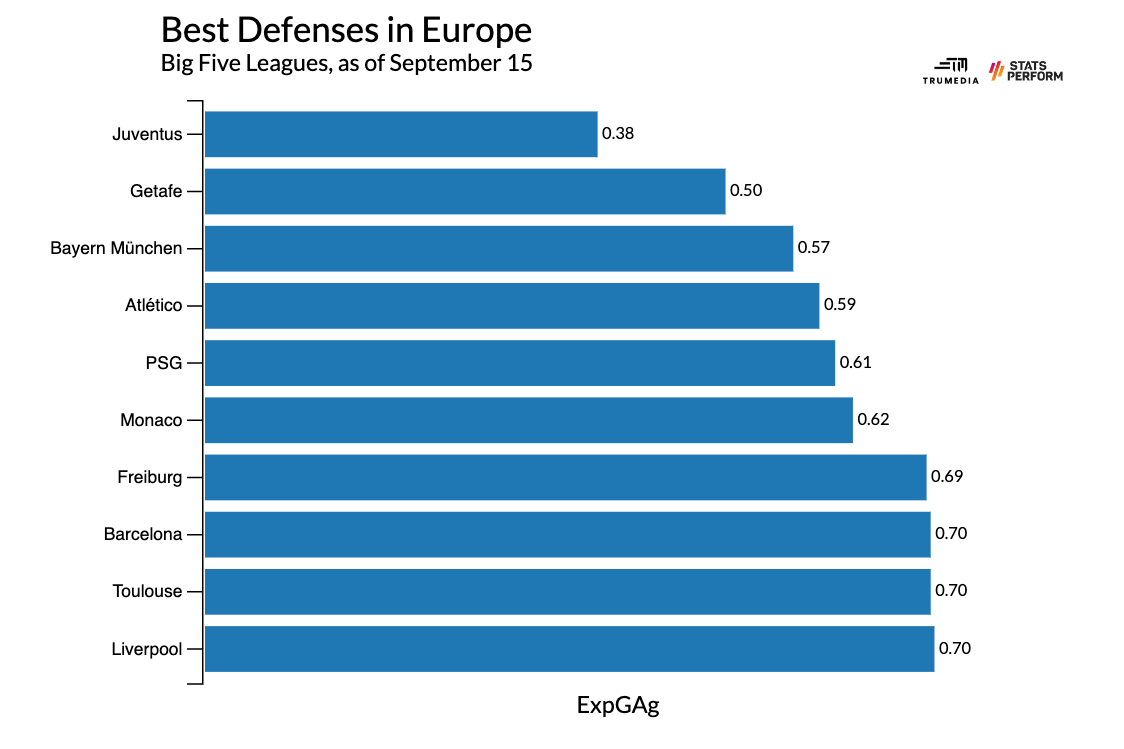
Don't glance away just yet, but it seems Atletico could be making a comeback. Take a look at this graph:
This graph illustrates the anticipated goals allowed in relation to the opponent's passing accuracy. Although Diego Simeone and his team seemed to stray from their usual performance after securing their second league title in 2021, they have returned to being a side that is relatively straightforward to move the ball against while being incredibly difficult to score on. Additionally, they rank second in La Liga for expected goals created, just behind Barcelona. Notably, all four of their key summer signings—Alexander Sorloth, Julián Álvarez, Conor Gallagher, and Robin Le Normand—have already received considerable playing time.
Having reached two finals and one semifinal in the last four years, Atletico hasn't made it past the quarter-finals since 2017. Is this the year they can break that streak?
Getting only six points from their opening three games is definitely a letdown, especially considering they went unbeaten all of last season. However, Leverkusen has showed they are playing at a similar level to what they did last season during these first three matches.
On the other hand, the teams in our top 10 all have a solid history of consistently performing at a high level over multiple seasons, some even for several years. In contrast, Leverkusen has only managed this once and has yet to prove themselves in the Champions League. They could find it tough this time and get eliminated before reaching the quarterfinals. However, they did retain their coach and all their main players, which gives them the potential to make a significant impact and compete against strong teams like Liverpool and Inter Milan in the group stage. I wouldn't be shocked by either scenario.
Four phrases to sum up this team: exceptionally skilled, quite seasoned.
In the previous season, Inter amassed an impressive 94 points and showcased exceptional statistics. I was eager to find out how they'd fare against teams like Manchester City or Real Madrid. They seemed to be in a comfortable position during the second leg of their Round of 16 matchup against Atletico Madrid, but everything fell apart for them. They lost their grip on the game, surrendered their lead, and ended up exiting the tournament before reaching the quarter-finals.
Last season, Inter's average age, calculated based on minutes played, was 29.1, making them the fourth oldest team in the top five European leagues. Therefore, it seems they focused on refreshing the team and adding younger talent during the recent offseason, didn't they? That's the expectation, isn't it?
So far this season, their average age has risen above 30 after four games.
I often discuss how managers and coaches may not influence outcomes as much as we assume, but that's a general observation. Some coaches elevate their teams' performance while others hinder it. I’m beginning to wonder if Bayern Munich might have chosen one of the latter. Vincent Kompany's Burnley entered the Premier League with a pricier roster and the hope of finishing far from the relegation zone. However, they opted for an excessively slow possession game against more skilled opponents—and it was a disaster. They didn’t make any changes and continued to struggle.
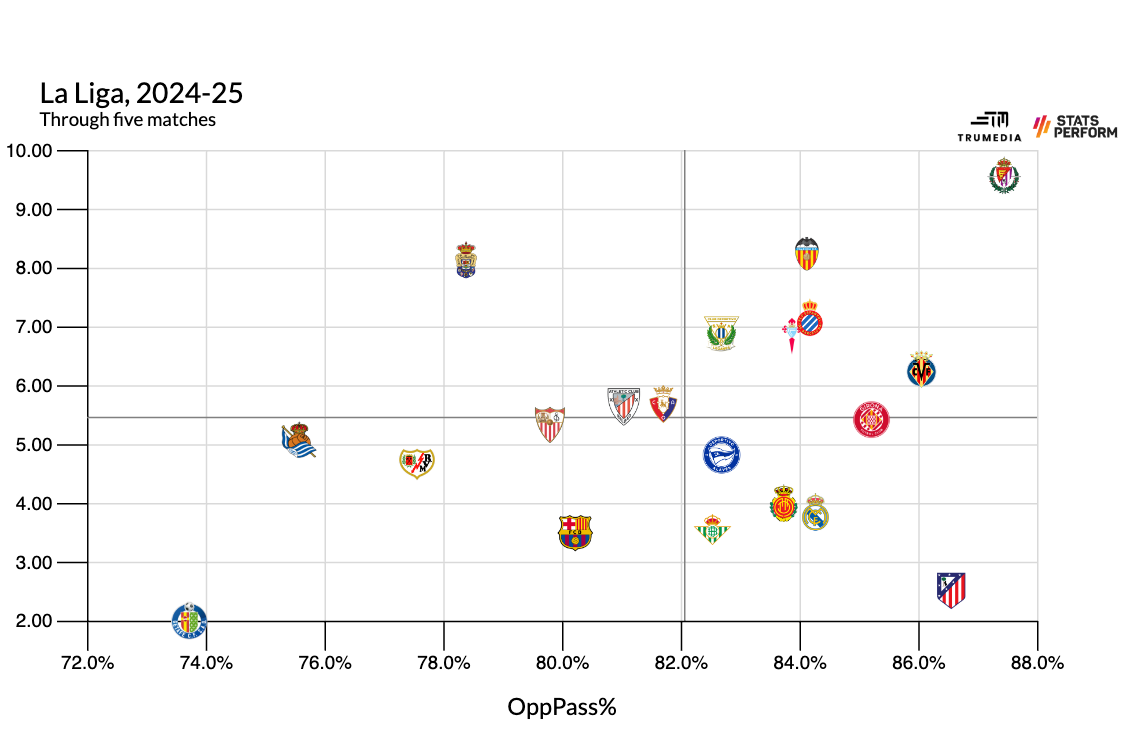
Bayern possesses enough skill to triumph even with average leadership and potentially secure the title, but they lack the distinction to rank higher than any other teams on this list.
In case you missed it, Kylian Mbappe is now part of Real Madrid. Gonçalo Ramos has injured his ankle and will be sidelined until at least mid-November. Randal Kolo Muani has a record of never scoring more than 13 goals from open play in a single season. Ousmane Dembélé and Bradley Barcola have each netted four goals in Ligue 1 this season, but I wouldn’t rely on either of them to suddenly become prolific goal-scorers on the wing.
While there's a significant gap in scoring, the overall picture is quite positive. Luis Enrique ranks among the top managers globally, and PSG boasts a wealth of young, athletic, and skilled players in nearly every other position on the field.
On Saturday, we witnessed the drawbacks of Slot's new, more cautious strategy: lots of ball control, but not many significant opportunities for either team, leading to a game decided by a single brilliant play. Despite the disappointing outcome — seriously disappointing, especially since they lost at home to Nottingham Forest! — the overall flow of the match suggested that a Liverpool victory was more probable than a defeat.
All in all, the first four matches have been impressive, and Liverpool's defense is stronger than ever, a level we didn’t quite see during Jurgen Klopp’s era. However, there’s a significant worry: can they come back from behind? Under Klopp, Liverpool excelled at applying pressure after falling behind, making them one of the best teams globally in that regard. In the Champions League, winning doesn’t always mean getting ahead first and then cruising to victory; there will be times you fall behind and need to find a way to break through an increasingly defensive opponent. In their game against Forest, Liverpool struggled to create opportunities once they were down.
These players definitely have a knack for stirring up trouble in order to make a comeback; Slot should find a way to leverage that tendency in any way possible.
I don't want to exaggerate, but, um...
Barcelona has significantly outperformed the competition in terms of goal difference and currently holds a four-point advantage over both Real Madrid and Atlético Madrid. Remarkably, they've achieved this without key players like Gavi, Frenkie de Jong, and Ronald Araújo. At the same time, they’ve managed this while relying on Pedri and Dani Olmo, who have both struggled with injuries in the past. Their standout player, Lamine Yamal, is just 17 years old and has been even more impressive in La Liga this season compared to his performance at the Euros. After four matches, his expected goals and assists per 90 minutes have nearly doubled from 0.47 to 0.86 compared to last season.
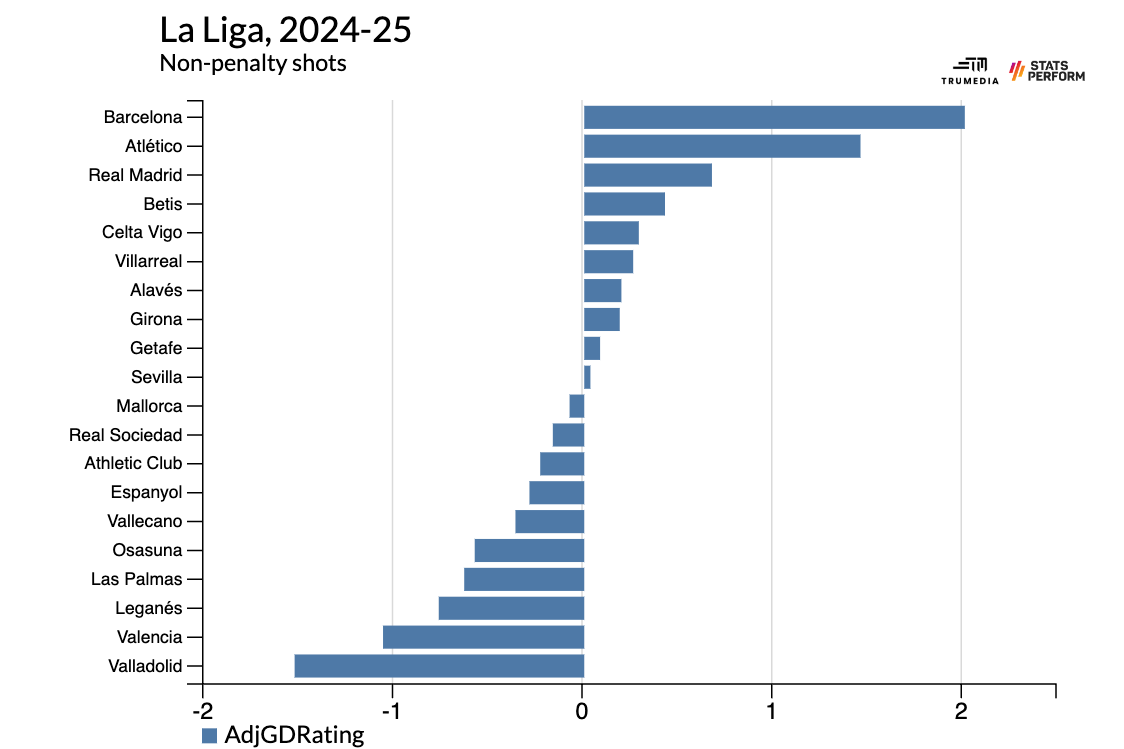
There are many potential pitfalls ahead, but under new coach Hansi Flick, the team seems to be coming together in a meaningful way. The top-notch performance we've witnessed this season is strong enough to secure several championships.
The injuries at the start of the season and a somewhat shaky beginning in the league raise a few eyebrows, yet Arsenal has shown exceptional form over the last two years, with most of their top players just hitting their peak years. When we evaluate their domestic league performance while taking into account the league's level of difficulty, Arsenal ranks as the third-best team globally over the past two seasons. This brings them to their current position: third in our rankings.
However, there’s a hint of skepticism here. Last year, Arsenal had a relatively straightforward group stage and faced a manageable draw against FC Porto in the round of 16. Top teams generally handle that matchup with ease, but Arsenal barely made it through on penalties. In the quarterfinals against a Bayern team that was not at its best, they were outmatched in both matches, especially failing to create any real chances after falling behind in the second leg. When you consider their disappointing showing against Sporting Lisbon in the Europa League the previous year, it’s clear that we haven’t really seen Arsenal triumph over a top-tier team outside of England.
Make sure to mark October 1st on your calendars for a real insight into their development: that’s when PSG will visit the Emirates.
So far, their performance hasn’t been disappointing, as earning 11 points from five matches is quite an achievement. Their expected goals and actual goals stats are also fairly impressive, but “fairly impressive” doesn’t quite cut it for Real Madrid. Especially not after they brought in one of the top players in the world just after securing the La Liga and Champions League titles.
I’m not convinced by the claim that Jude Bellingham's injury is to blame. You can't just bring in a player like Mbappe and then use injuries as an excuse. Over half of Real Madrid's goals (four out of seven) have come from penalties so far. Their attacking play has appeared disjointed, especially since both Vini and Mbappe tend to occupy similar wide-left areas. Additionally, this group of players is not built for high-pressure play, meaning there will be times in every match when the defenders will need to step up and make crucial plays.
They hold the second spot mainly because their lineup includes stars like Vinícius Júnior, Kylian Mbappe, Rodrygo, Jude Bellingham, Federico Valverde, Aurelien Tchouaméni, and Eduardo Camavinga. Plus, the team is led by the experienced Carlo Ancelotti.
In the end, they'll come to understand it when the temperatures rise again in 2025. That's simply how they operate.
They've surpassed my expectations for the beginning of the season. Erling Haaland is currently on track to net 85 goals in the Premier League. While I doubt he will reach that number, I definitely wouldn't dismiss the possibility of him achieving a 50-goal season in domestic play at some time in the future.
As this analysis wraps up, it concludes in a familiar way: while Manchester City is considered the top contender for the Champions League title, the most probable scenario is that a different team takes home the trophy.









































